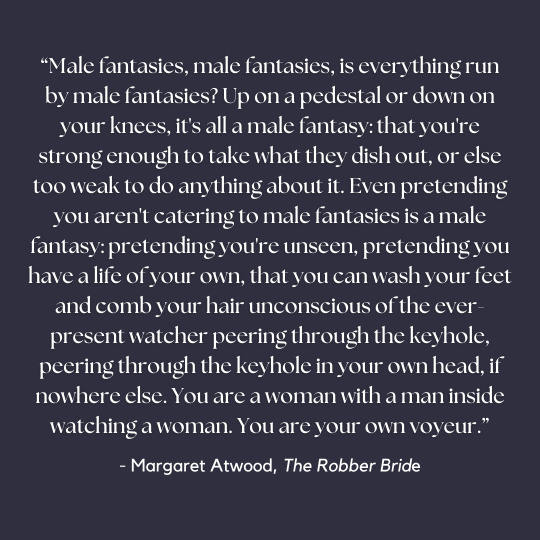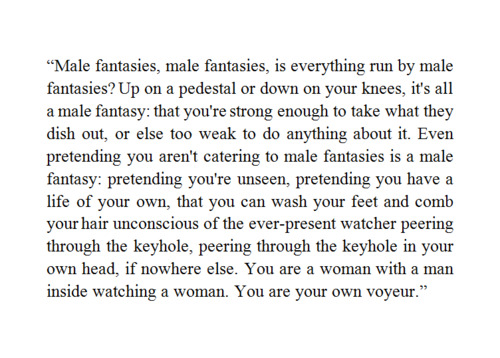#the robber bride
Text

Yea…
135 notes
·
View notes
Text
"How can she describe the emptiness? Acres of vacancy, which she filled with whatever she could, with knowledge, with dates and facts, more and more of them, pouring them into her head to silence the echoes."
--Margaret Atwood, The Robber Bride.
#margaret atwood#the robber bride#writeblr#spilled ink#prose#love poem#inspiring quotes#words words words#deep thoughts#spilled poetry#poetry#poetrycommunity
8 notes
·
View notes
Photo

81 notes
·
View notes
Text

9 notes
·
View notes
Text

42 notes
·
View notes
Text
”The two martinis aren’t helping, in the get-a-grip department.”
13 notes
·
View notes
Quote
You are a woman with a man inside watching a woman. You are your own voyeur.
Margaret Atwood, The Robber Bride
#margaret atwood#the robber bride#literature#dark academia aesthetic#you have no idea how this lives in my head rent free#i know margaret atwood has become problematic these days but she really had a way of saying The Thing didn't she#immortal poets society#some are born to endless night#blake's last braincell
32 notes
·
View notes
Quote
Male fantasies, male fantasies, is everything run by male fantasies? Up on a pedestal or down on your knees, it's all a male fantasy: that you're strong enough to take what they dish out, or else too weak to do anything about it. Even pretending you aren't catering to male fantasies is a male fantasy: pretending you're unseen, pretending you have a life of your own, that you can wash your feet and comb your hair unconscious of the ever-present watcher peering through the keyhole, peering through the keyhole in your own head, if nowhere else. You are a woman with a man inside watching a woman. You are your own voyeur.
Margaret Atwood, The Robber Bride
19 notes
·
View notes
Text
The Male Gaze: The Man Inside My Head
I’ve been thinking a lot about Margaret Atwood’s famous quote about male fantasies from ‘The Robber Bride’:
“Male fantasies, male fantasies, is everything run by male fantasies? Up on a pedestal or down on your knees, it’s all a male fantasy: that you’re strong enough to take what they dish out or too weak to do anything about it. Even pretending you aren’t catering to male fantasies is a male fantasy: pretending you’re unseen, pretending you have a life of your own, that you can wash your feet and comb your hair unconscious of the ever present watcher peering through the keyhole, peering through the keyhole in your own head, if nowhere else. You are a woman with a man inside watching a woman. You are your own voyeur.”
So I decided to write a poem about it: this is called ‘The Man Inside My Head’
I can’t remember a time in my life where I did not have a voyeuristic relationship with who I am and who I’m trying to be.
There is a man inside my head watching me, his gaze always lingering on me as I go through the motions of my day.
He watches me intently, like a scientist examining new matter.
He watches me as a child, pedalling my bicycle along the streets of my youth.
He watches my balance as I ride, keeps his eyes on me as I fall and scrape my knees and cry, disapproves of my inability to pedal with grace, disapproves of the cuts on my arms and the tears on my face.
He watches me as I sit on the floor of my 6th grade classroom with my legs pressed together, covering myself with a jumper, in a misguided attempt at modesty.
He watches me as an adolescent, sitting in the middle of school assemblies, measuring the amount of space I take up, as I learn all the ways I can shrink myself more.
He watches me as I grow, as my body becomes fuller, as I bleed and veer into womanhood and his gaze becomes harder, more demanding.
He watches the way I speak, the controlled tenor of my voice, how soft it can be, how sweet and yielding like sugar cubes that melt in your tea.
He watches the way I am with people, how I interact - politely and with deference, but never timid. He doesn’t like meekness.
He watches the way I treat the people I know, whether I am kind and sympathetic enough, whether I carry their pain and forgive their mistakes and shoulder their burdens and help them through hurdles.
He watches the way I cry in silence on my bathroom floor, the way the tears make my skin glow, if my lashes are more prominent as I stare into my mirrored reflection hoping that I am suffering beautifully, hoping he finds my pain loveable.
He watches as I rip hair off my over tired body, welcoming hurt in the pursuit of beauty.
As I brush, and scrub, and massage and pull and thread and wash, till I feel clean enough for him to look at.
He watches me as I lie in bed, and decide which position will allow me to look my best, which angle is most flattering as I try to get some rest.
He watches as I pretend to be above these things, as I pretend not to care about his or others opinions, my half baked defiance in the face of gendered expectation.
He watches me as I try to rebel, but making sure I do it in a way that he finds sexy, my rebellion needs to be pleasing, attractive, a challenge he finds interesting or amusing enough to indulge.
The man inside my head watches me constantly as I strive for unattainable perfection, scrutinises every inch of my body, every element of my personality as I try to live up to his warped fantasy.
The man inside my head is every man I imagine imagining me: my voyeur watching me through the Keyhole and no one ever told me that I exist outside of him.
That I exist outside the realm of men’s thoughts, that the male gaze is embedded so deeply in our psyche that the male fantasies we internalise take lifetimes to erase, that this mind and body comes with decades of systemic brainwash.
Even in the privacy of my own thoughts, in the sanctuary of my own mind, the male gaze governs everything, colours my world unshakeably.
It sits atop a throne, issues commands, enforces an order in which I am made small, in which I am made scared.
The man inside my head knows that I want to be wanted more than I want to want.
He knows that I want to be the object of love and desire, that I am yearning for arms and attention and affection.
And that I am at the same time repulsed by that.
But still.
At least, at least I know now of his presence, at least I know now, at least intuitively, that I am not here to make him comfortable.
At least I know now of a moment when I am enough and that is enough if this is the moment that I am no longer small, if this is the moment I am no longer scared.
In this moment, I am worthy even if the man inside my head doesn’t think I’m pretty.
In this moment, I do not owe it to him to be his fantasy. In this moment, I realise I never owed him anything at all.
#poetry#writing#quotes#feminism#excerpt from a book i'll never write#personal rant#margaret atwood#male fantasies#the male gaze#feministpoem#feministpoetry#the robber bride#feminist poem#female gaze#womens rights#brown women#women writers
35 notes
·
View notes
Text

[TEXT] “"Male fantasies, male fantasies, is everything run by male fantasies? Up on a pedestal or down on your knees, it's all a male fantasy: that you're strong enough to take what they dish out, or else too weak to do anything about it. Even pretending you aren't catering to male fantasies is a male fantasy: pretending you're unseen, pretending you have a life of vour own, that you can wash vour feet and comb your hair unconscious of the ever-present watcher peering through the keyhole, peering through the keyhole in your own head, if nowhere else. You are a woman with a man inside watching a woman. You are your own voyeur.”
Margaret Atwood’s The Robber Bride, 1993
52 notes
·
View notes
Quote
Male fantasies, male fantasies, is everything run by male fantasies? Up on a pedestal or down on your knees, it’s all a male fantasy: that you’re strong enough to take what they dish out, or else too weak to do anything about it. Even pretending you aren’t catering to male fantasies is a male fantasy: pretending you’re unseen, pretending you have a life of your own, that you can wash your feet and comb your hair unconscious of the ever-present watcher peering through the keyhole, peering through the keyhole in your own head, if nowhere else. You are a woman with a man inside watching a woman. You are your own voyeur.
Margaret Atwood (The Robber Bride)
30 notes
·
View notes
Quote
She's used to silences: she can distinguish between full silences and empty ones, between those that come before and those that come after. Just because there's a silence it doesn't mean that nothing is going on.
Margaret Atwood, The Robber Bride
41 notes
·
View notes
Text
MARGARET ATWOOD
The Robber Bride
Every ending is arbitrary, because the end is where you write The End. A period, a dot of punctuation, a point of stasis. A pinprick in the paper: you could put your eye to it and see through, to the other side, to the beginning of something else. Or, as Tony says to her students, Time is not a solid, like wood, but a fluid, like water or the wind. It doesn't come neatly cut into even-sized length, into decades and centuries. Nevertheless, for our purposes we have to pretend it does. The end of any history is a lie in which we all agree to conspire.
2 notes
·
View notes
Text

A review of The Robber Bride by Margaret Atwood
March 30, 2004
In the end, we choose our point, arbitrarily: “A period, a dot of punctuation, a point of stasis.” Atwood reminds us that the story could easily end elsewhere, that endings are random, and that, for her protagonists (but not for Zenia), life moves forward and love, whether for a husband or for children, remains.
Reviewed by Magdalena Ball
In the opening to The Robber Bride, Margaret Atwood sets up the slightly ironic self-referential tone of the novel. Antonia Fremont – “Tony” – is exploring where the “story of Zenia” ought to begin…”someplace bruised, and very tangled. A European print, hand-tinted, ochre-coloured, with dusty sunlight and a lot of brushes in it – brushes with thick leaves and ancient twisted roots, behind which, out of sight in the undergrowth and hinted at by only a boot protruding, or a slack hand, something ordinary but horrifying is taking place.” Zenia is a cartoon character, impossibly beautiful: “like a photo, a high-fashion photo done with hot light so that all freckles and wrinkles are bleached out and only the basic features remain: in her case, the full red-purple mouth, disdainful and sad; the huge deep eyes, the finely arched eyebrows, the high cheekbones tinged with terracotta.” Zenia appears almost magically in the lives of three women, Tony, Roz, and Charis, and using some nasty confidence tricks, manages to infiltrate their lives, ruin their happiness, destroy their illusions, steal or extort money from them, and wreck their fragile homes.
So who is Zenia, and what happens in this extraordinary novel? The basic story is a simple one, where a beautiful women brings together three much plainer ones, and mirrors the Grimm’s fairy tale that the title alludes to. Zenia ties the three protagonists together through their mutual hatred and the desire for revenge she inspires in them. In the “present” which is as illusive in this, as in many other of Atwood’s novels, Tony, Roz, and Charis are meeting in the “Toxique” restaurant for lunch, a regular celebratory meal they have had since the Zenia’s death, 5 years earlier. All of them were invited to, and stood together rejoicing at Zenia’s funeral. At this particular lunch, Zenia, beautiful as ever, and clearly alive, walks in. Although they pretend not to see her, and she pretends not to see them, they are all aware of one another. From Tony, Roz and Charis’ initial airy kisses, they become allies in pain, hugging, shivering, questioning their world and wondering what kind of mission for destruction Zenia can be on. Internally, they all vow revenge, self-protection: “Zenia, you’re dead meat. You’re history.”
The obvious plot is about how these women work through their anger towards Zenia and what ‘happens’ to her, but this novel is really not about Zenia at all. She is a catalyst, and hardly real, with silicone breasts, a tiny Betty Boop styled waist, a nose job, and clouds of nondescript hair. She is a dream, a succubus. The real story is about Tony, Roz and Charis. The story begins and ends with Tony, and her attempts to reconstruct Zenia, which immediately sets the reader at a distance from Zenia. She is ‘out of the frame.’ It also creates another present tense – one which is further removed from the ‘now’ of the Toxique chapters. Each of the protagonists have their own chapters, and their own tragic backstories. In a combination of flashbacks which are so subtly handled that they are also placed in the present tense, and varying points of view, we begin to learn about these, empathising deeply with the tiny and lonely young Tony with her missing mother, the physically and then sexually abused Karen/Charis, or the overweight, overworked Roz. The tragedy for these women is not Zenia. All of them have serious vulnerabilities, split personalities of a sort, and have incurred psychic baggage well before meeting the men that Zenia takes from each of them. Zenia’s betrayal, however nasty, is small potatoes next to what they’ve already undergone. It is, in fact, almost too convenient that each of them encounters Zenia – that she seeks them out, and that they have already made a connection with one another prior to Zenia’s arrival. Zenia’s ‘real’ back story remains hidden. We only have her many ‘fabrications,’ delivered through each of the protagonists. She remains, as Tony clearly points out, invited in. The ugly sister – the shadow side, a summonsed harpy.
Atwood is a master of the narrative voice, and she handles the different points of view perfectly. Tony’s narrative is crisp, funny and rich, riddled with her gift of being able to convert words into their backwards images. Tony’s dyslexic capability renders the most mundane words, like “bridge club” into their mirror image, great warriors, secret codes. She’s strong, tough, able to look nasty battles, knife welding students, and death in the eye. Charis’ narrative is suitably airy. Full of auras, vitamins, roughage and karma. Roz’s is witty, strong, and loud. Their personalities come through clearly, and even their children (especially Roz’s larger than life twins) are more real than Zenia. The backstories give the novel breadth, expanding the setting from the ‘present tense’ of 1990-91 downtown Toronto, with the Gulf War, the increasing crime, the real estate developments, recession, famine in Africa, through the personal development of these women in their entire 40-50 year span. The writing is always tight, well paced, and often beautiful, taking us deep into the minds of the three protagonists.
There are a few minor things which don’t work so well. Zenia’s involvement in the war is a little suspect, as is her death, and the revelation about Larry, Roz’s son, seems forced. The writing itself is so stunning though, and Atwood’s development of the intricate strands of the story coupled with the deep psychic exploration of the protagonists works so well that it hardly matters. Atwood has complete control over the balance between perfect realism and the slight edge of mysticism that her work is known for.
Zenia may well have given each of these heroines a gift, dark and painful but also enabling. They become, through her, united, not only with one another, but with themselves. What does Zenia really take from these women? The men she uses turn out to be as false as her own history. As Tony tells us in a slightly different context, “all Zenia can get out of her is a handful of shards
”:Who was the enemy? What past wrong was she seeking to avenge? Where was her battlefield? Not in any one place. It was in the air all around, it was in the texture of the world itself; or it was nowhere visible, it was in among the neurons, the tiny incandescent fires of the brain that flash up and burn out. (563)
In the end, we choose our point, arbitrarily: “A period, a dot of punctuation, a point of stasis.” Atwood reminds us that the story could easily end elsewhere, that endings are random, and that, for her protagonists (but not for Zenia), life moves forward and love, whether for a husband or for children, remains. “Time is not solid, like wood, but fluid like water or the wind. It doesn’t come neatly cut into even sized lengths, into decades and centuries. Nevertheless, for our purposes we have to pretend that it does. The end of any history is a lie in which we all agree to conspire.”
3 notes
·
View notes
Text
“Male fantasies, male fantasies, is everything run by male fantasies? Up on a pedestal or down on your knees, it's all a male fantasy: that you're strong enough to take what they dish out, or else too weak to do anything about it. Even pretending you aren't catering to male fantasies is a male fantasy: pretending you're unseen, pretending you have a life of your own, that you can wash your feet and comb your hair unconscious of the ever-present watcher peering through the keyhole, peering through the keyhole in your own head, if nowhere else. You are a woman with a man inside watching a woman. You are your own voyeur.”
Margaret Atwood, The Robber Bride
11 notes
·
View notes
Text
”The dead return in other forms because we will them to.”
6 notes
·
View notes